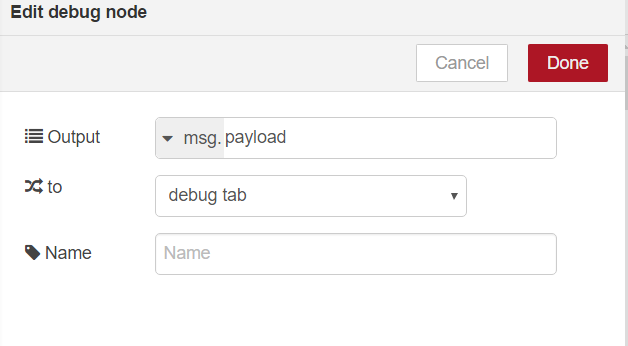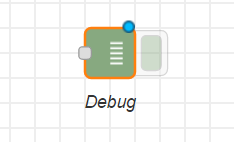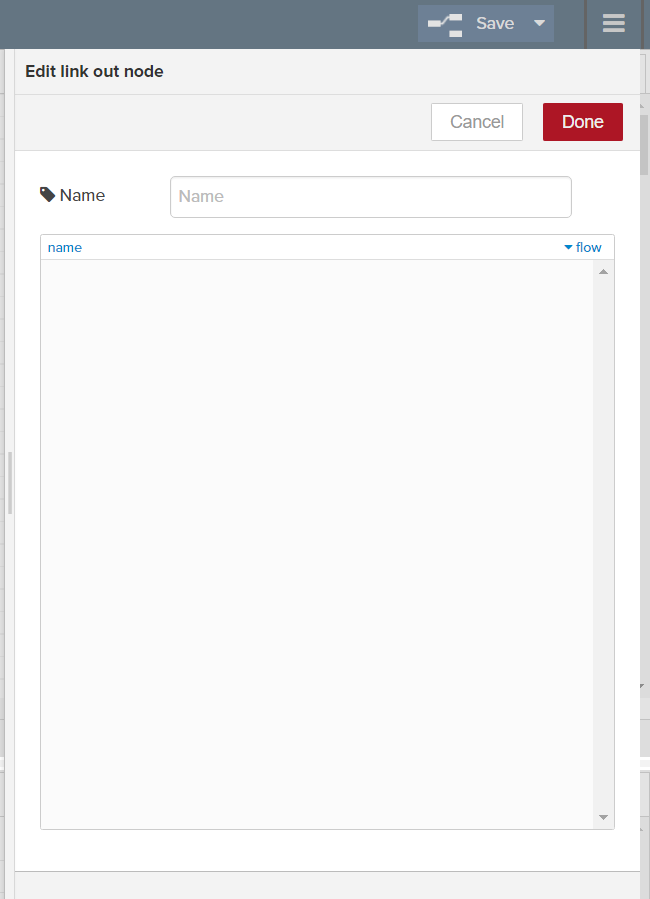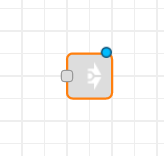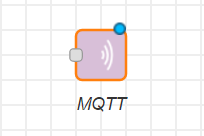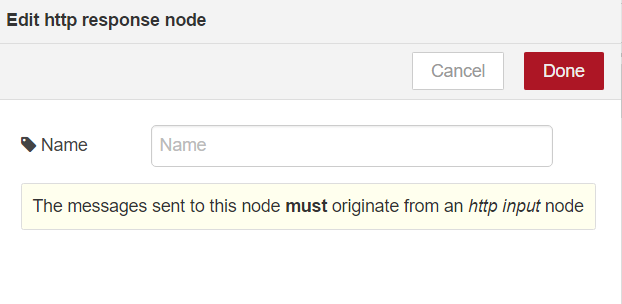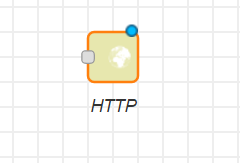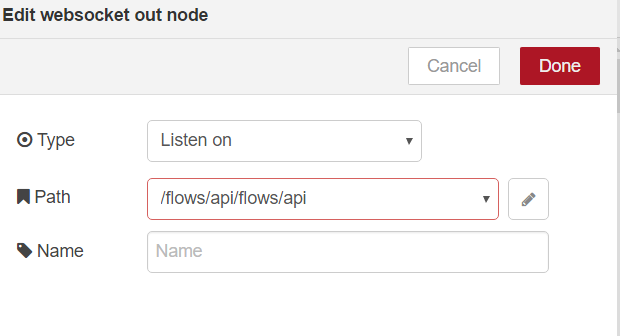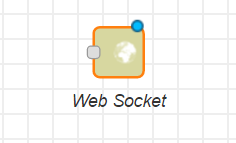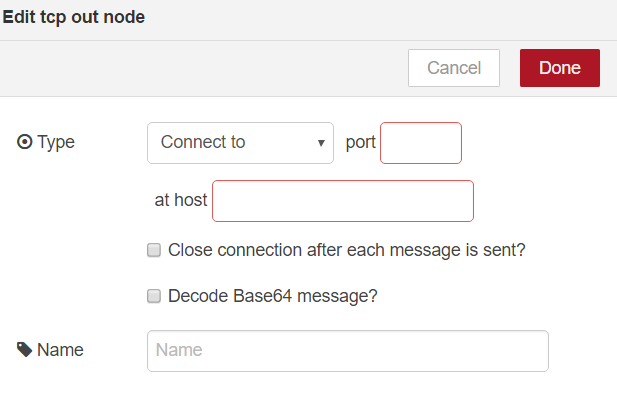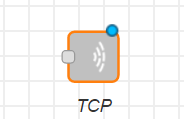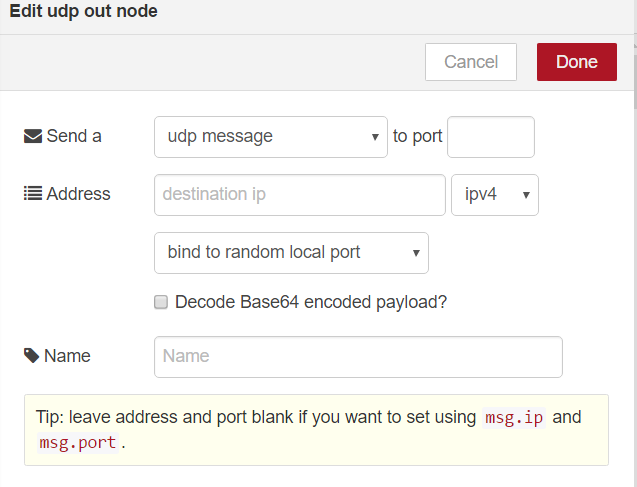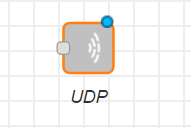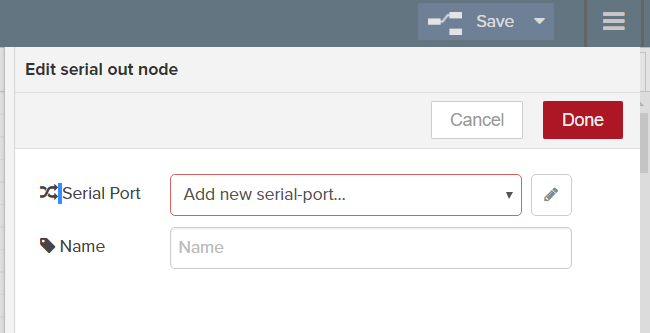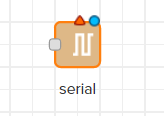Output Nodes
Estimated reading time: 6 minutes
The output nodes receive the output from the input nodes. Their direction of communication, with respect to Flows, is outgoing. Each input node corresponds to an output node.
Debug NodeThis is the most helpful code to debug messages on the fly. The messages are displayed in the Debug pane. The node can be configured to see the whole object or just msg.payload.
|
Debug Node
[
{
"id": "3fc09200.a531de",
"type": "debug",
"z": "ea431baa.b2d16",
"name": "Debug",
"active": true,
"console": "false",
"complete": "payload",
"x": 505.5,
"y": 198.60000610351562,
"wires": []
}
]
|
|
Link NodeUse this node to create virtual wires between nodes.
|
[
{
"id": "28a47eb0.f0cf92",
"type": "tab",
"label": "Test"
},
{
"id": "36bdd39a.c0228c",
"type": "link out",
"z": "28a47eb0.f0cf92",
"name": "",
"links": [],
"x": 220,
"y": 200,
"wires": []
}
]
|
|
MQTT NodeThe user can publish any message to the server using this MQTT out node. It supports the basic authentication as well as quality of service (QoS) levels.
|
Mqtt
[
{
"id": "71eb845b.97eb7c",
"type": "mqtt out",
"z": "ea431baa.b2d16",
"name": "MQTT",
"topic": "litmus/loop/devices",
"qos": "0",
"retain": "",
"broker": "5fb9e11d.1939d",
"x": 427.5,
"y": 218.60000610351562,
"wires": []
},
{
"id": "5fb9e11d.1939d",
"type": "mqtt-broker",
"z": "",
"broker": "liveiot.mq.litmusloop.com",
"port": "1883",
"clientid": "ab2bsnjasdalflak",
"usetls": false,
"compatmode": true,
"keepalive": "60",
"cleansession": true,
"willTopic": "",
"willQos": "0",
"willPayload": "",
"birthTopic": "",
"birthQos": "0",
"birthPayload": ""
}
]
|
|
HTTP NodeThis node sends the responses to the messages received from the HTTP input node. The body of the response message is defined by the msg.payload and it can have headers and a status code defined.
|
HTTP Node
[
{
"id": "ea431baa.b2d16",
"type": "tab",
"label": "Flow 1"
},
{
"id": "f07964f3.0ce348",
"type": "HTTP response",
"z": "ea431baa.b2d16",
"name": "",
"x": 580,
"y": 200,
"wires": []
}
]
|
|
Web Socket NodeThis node sends the message as msg.payload to the web server that is configured. If the connection to the particular client is defined for a session, it sends it to that client or alternatively, broadcasts the message to all clients.
|
Web Socket Node
[
{
"id": "ea431baa.b2d16",
"type": "tab",
"label": "Flow 1"
},
{
"id": "3aa0f665.dca43a",
"type": "websocket out",
"z": "ea431baa.b2d16",
"name": "Web Socket",
"server": "46fd1826.e79f68",
"client": "",
"x": 532.5,
"y": 190.60000610351562,
"wires": []
},
{
"id": "46fd1826.e79f68",
"type": "websocket-listener",
"z": "",
"path": "/flows/api",
"wholemsg": "false"
}
]
|
|
TCP NodeThis node sends TCP messages to a configured TCP port. Also, it can reply to a specific port.
|
TCP Node
[
{
"id": "85a93a86.1c6558",
"type": "tcp out",
"z": "ea431baa.b2d16",
"host": "127.0.0.1",
"port": "1883",
"beserver": "client",
"base64": false,
"end": false,
"name": "TCP",
"x": 551.5,
"y": 180.60000610351562,
"wires": []
}
]
|
|
UDP NodeThis node sends UDP messages to the host that is configured on a specific port. It also can broadcast messages that can be configured from message properties.
|
UDP Node
[
{
"id": "e655faec.6ec9d8",
"type": "udp out",
"z": "ea431baa.b2d16",
"name": "UDP",
"addr": "10.0.0.1",
"iface": "",
"port": "123",
"ipv": "udp4",
"outport": "",
"base64": false,
"multicast": "false",
"x": 523.5000157356262,
"y": 177.60000610351562,
"wires": []
}
]
|
|
Serial NodeUse this node to create a connection to an outbound serial port.
|
[
{
"id": "28a47eb0.f0cf92",
"type": "tab",
"label": "Test"
},
{
"id": "44305081.c1271",
"type": "serial out",
"z": "28a47eb0.f0cf92",
"x": 220,
"y": 180,
"wires": []
}
]
|
|
